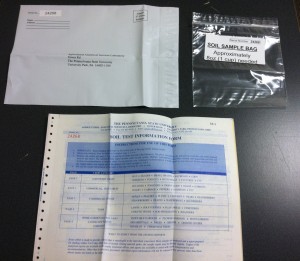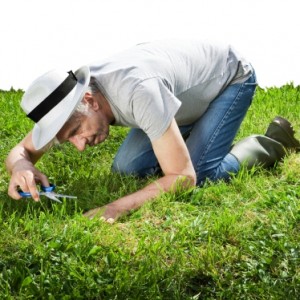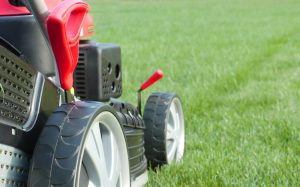 I am one of those few lucky people you meet who gets the opportunity to wake up each day and do what I love – going to work for me is more often a joy than drudgery. I’m especially blessed that I get to do this at two places. Working at Tomlinson Bomberger AND being a pastor at a local church affords me opportunities to serve people in many different ways. I thought it might be fun to blend the two together and offer you the 10 Commandments of Lawn Care.
I am one of those few lucky people you meet who gets the opportunity to wake up each day and do what I love – going to work for me is more often a joy than drudgery. I’m especially blessed that I get to do this at two places. Working at Tomlinson Bomberger AND being a pastor at a local church affords me opportunities to serve people in many different ways. I thought it might be fun to blend the two together and offer you the 10 Commandments of Lawn Care.
Ten Commandments of Lawn Care
I. Don’t put other lawns ahead of your own
We frequently talk to clients who will be distracted by trying to help their neighbors, parents, or friends with lawn and landscape needs, only to neglect their own. If you truly want to have a nice lawn, it does require some investment of time. Make sure you’re putting the effort in.
II. Don’t expect a “golf course” – or any other sporting field of play for that matter
Golf courses, baseball infields, and soccer pitches are just that – sporting venues. They aren’t residential lawns. Unless you plan on hiring a full-time grounds crew, like at Fenway, we suggest you give this idea a rest.
III. Respect the process
One of the neat things about lawn care is that it is as close to instant gratification as you can get with plants. But, even though it’s as close as you can get, it’s still NOT instant. It’s going to take some time, especially if you’ve recently acquired a lawn that’s seen years of neglect. Be patient, and follow the advice of a lawn care professional to get you moving in the right direction. This one of the 10 Commandments of Lawn Care!
IV. Remember to get it tested
Soil tests should be an integral part of any lawn care program. They are inexpensive, but shed a lot of light on why you might be experiencing problems like rust, poor color, and meager results from a re-seeding. Don’t skip this crucial step, and be wary of working with a company that never recommends it.
 Soil testing kit from Penn State University
Soil testing kit from Penn State University
V. Heed the advice of a reputable professional
You know that neighbor or co-worker who “knows everything?” Nothing is more frustrating to a lawn care professional than a client who “knows better” than them. If you go to the trouble of identifying and working with a respected, reputable lawn care provider, listen to their recommendations. It might cost you more money on the front end of your journey to get things right, but it will pay dividends in healthy, beautiful turf.
VI. Don’t “scalp” your lawn
There was once a client who was consistently frustrated by the look and condition of his lawn, due to the poor color and weeds everywhere. This client’s personal representative was consistently frustrated by his phone calls, because he refused to heed advice about his mowing practices – he was mowing it almost down to the soil level!
Your cool-season turf (bluegrass, fescue, perennial rye, etc.) should never be mowed at lower than 3” after the grass is cut. Don’t trust the mower’s third notch, or the setting of “3” on the mower deck, as these vary from one manufacturer to another. To make sure your mower is at the proper height, place it on a flat, level surface (garage floor work well), and use a ruler or tape measure to make sure the mower deck or the blades are off the ground at least three inches. If it won’t go that high, set it as high as possible and mow there.
VII. Don’t take too much off the top
 Another frequent issue we educate customers about is how much they are removing from the turf. A good rule is to remember is called the “One-Third Rule.” Basically, you should never remove more than one-third of the leaf tissue (grass blade) at a time while mowing. What does this mean? It means you shouldn’t let your lawn grow really long and unruly, only to mow it short not long after. This places a tremendous amount of stress on the turf.
Another frequent issue we educate customers about is how much they are removing from the turf. A good rule is to remember is called the “One-Third Rule.” Basically, you should never remove more than one-third of the leaf tissue (grass blade) at a time while mowing. What does this mean? It means you shouldn’t let your lawn grow really long and unruly, only to mow it short not long after. This places a tremendous amount of stress on the turf.
VIII. Don’t be married to a regular mowing schedule
We have witnessed clients who mow their lawns twice a week, rain or shine, all season long. We have also seen clients who steadfastly refuse to mow their lawns more than once every two weeks (usually the neighbors hate these clients). Both extremes are dysfunctional.
You should mow your lawn when it needs it, by following the “One-Third Rule” outlined above. How do you know when it needs mowed? Your lawn needs mowed when you will be removing about one-third of the leaf tissue. In the spring and fall, this means you may have to mow 2-3 times per week if we’re having a particularly rainy season. Conversely, in the summer, you may not have to mow for 2-3 weeks, since the cool-season grasses typically go into a natural dormancy when it’s hot and dry, like in July and August here in Central Pennsylvania. Don’t get hung up on mowing on a schedule – pay attention to your lawn and you’ll know when you need to mow.
 Adjust your mowing schedule based on weather conditions.
Adjust your mowing schedule based on weather conditions.
IX. Don’t neglect your regular maintenance
Mowing is a really important part of keeping the turf healthy, but just as important is a regular feeding and weed control schedule. This is something that varies with region, climate, rainfall, and state and local regulations. Here in Lancaster, PA, a program that includes six regular “weed and feed” type visits is pretty standard. This regular schedule allows turf to get the nutrients it needs to stay healthy while at the same time eliminating the undesirable plants that compete for that nutrition. If you want a good lawn, you have to do this.
X. Don’t forget to core aerate
We hear from clients regularly that “don’t believe in” aerating or that “have never done that before.” It’s something that is recommended for any clay-based soil, which is exactly what we have here in Central Pennsylvania. There’s a ton of university research to back this up as well. It’s like changing the oil in your vehicle – might not be glamorous or clean, but it’s a necessary part of keeping things running smoothly. Just once a season should do for this service.
Conclusion
We hope you enjoyed reading about the 10 Commandments of Lawn Care. If you have any other questions about Lawn Care in Lancaster, PA, Lebanon, PA, Harrisburg, PA or York, PA, or you’d like to talk to us about getting a personalized Lawn Care consultation, please don’t hesitate to contact us.

